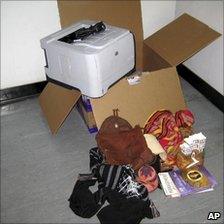Air freight from Yemen and Somalia banned
- Published
Theresa May: "We will review all aspects of air freight security and work with international partners to make sure that our defences are as robust as possible"
Unaccompanied freight flown to the UK from Somalia as well as Yemen will be banned in the wake of the cargo plane bombs, the home secretary has told MPs.
The move was based on possible contact between al-Qaeda in Yemen and Somali terrorist groups, Theresa May said.
Toner cartridges over 500g will also be banned from hand baggage on UK flights.
There was no information another attack was imminent, she said, but she confirmed a review of all aspects of air freight security.
Mrs May was speaking to MPs in the Commons after a meeting of the government's emergency planning committee Cobra.
It met on Monday following Friday's discovery of a bomb on a US-bound UPS cargo plane at East Midlands airport and a similar bomb on a FedEx plane in Dubai.
The explosive contained in the device was found after a tip-off and was not picked up by initial screening.
Investigators at East Midlands carried out a re-examination as a precaution and the bomb was found hidden in a printer cartridge posted in the Yemeni capital, Sanaa.
UK officials said the tip-off came from al-Qaeda member Jabr Al-Faifi who turned himself in to Saudi authorities two weeks ago.

Two explosive devices were found on cargo planes
Mrs May announced the measures, which will come into force at midnight, as she updated MPs on the air cargo bomb plot.
She said two bombs identified in the plot originated in Yemen but suspending freight flights from Somalia was necessary because of a possible link between terrorists in the two countries and concerns over airport security in Mogadishu, Somalia's capital.
She said: "We are in a constant battle with the terrorists. They are always looking for another... innovative way, in which they can try to get around our defences."
She announced that, external the government would:
Review all aspects of air freight security and work with international partners to make sure UK defences were as robust as possible.
Update the guidance given to airport security personnel based on what it has learned to enable them to identify similar packages in future.
Extend the suspension of unaccompanied air freight to the UK not just from Yemen but also Somalia. She said the move was precautionary and would be reviewed in coming weeks.
Suspend the carriage of toner cartridges larger than 500g in passengers' hand baggage on flights departing from UK airports
Prohibit the carriage of these items by air cargo into, via or from the UK unless they originated from a known consignor - a regular shipper with security arrangements approved by the Department for Transport.
The restrictions on toner will be in place for one month while a "sustainable, proportionate, long-term security regime" is developed.
BAR UK - which represents more than 80 UK airlines - and airport operator BAA have said they will work with the government on the changes.
Direct passenger and cargo flights from Yemen to the UK were suspended following the attempted downing of a plane bound for Detroit on Christmas Day 2009.
This weekend, the carriage of unaccompanied air freight from Yemen on passenger and courier flights was also suspended.
Mrs May told MPs an "intensive investigation" had been taking place in the UK and overseas following the discovery of the explosive devices.
She said: "We know that both explosive devices originated in Yemen. We believe that they were made and dispatched by the organisation known as al-Qaeda in the Arabian Peninsula.
"This group, based in Yemen, was responsible for the attempted downing of an aircraft bound for Detroit on December 25 last year.
"The devices were probably intended to detonate mid-air and to destroy the cargo aircraft on which they were being transported."
She said analysis of the device at East Midlands found it was "viable" and "could have succeeded in bringing down the aircraft".
While there was no information another attack by this group was imminent, she said it had been responsible for a number of recent attacks in Yemen, including attempts to kill British diplomats.
Shadow home secretary Ed Balls praised the "brave and vital work" by security and police personnel but questioned why the bomb at East Midlands airport was not discovered during the first police search.
He said the fact that the two devices had been carried on a series of five aircraft, three of them passenger flights, raised "serious questions about the security of our airspace".
And he questioned spending cuts to the intelligence, counter-terror police and UK Border Agency budgets.
'Technology aid'
Former home secretary Lord Reid, chairman of the Institute for Security and Resilience Studies at University College London, said checks should take place continuously, not just after an incident.
He said: "I would like them to look at airports abroad as well as here.
"If we're giving foreign aid to some of these countries, why not make some of that aid, at least, technology that will help to secure their airports and keep us safe."
Liberal Democrat MP Simon Hughes warned of reports of "variable levels of rigour deployed by different companies with responsibility across our airports".
Earlier, Prime Minister David Cameron, who chaired the Cobra meeting, told MPs that Britain must take every possible step to "cut out the terrorist cancer" that existed in the Arabian Peninsula.